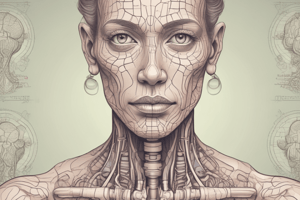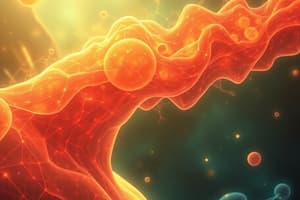Podcast
Questions and Answers
What is the primary cause of hypercalcemia in hyperparathyroidism?
What is the primary cause of hypercalcemia in hyperparathyroidism?
- Decreased phosphate excretion by the kidneys
- Increased phosphate reabsorption by the kidneys
- Increased calcium reabsorption by the kidneys (correct)
- Decreased calcium excretion by the kidneys
Which gastrointestinal manifestations are common in patients with high serum calcium levels in hyperparathyroidism?
Which gastrointestinal manifestations are common in patients with high serum calcium levels in hyperparathyroidism?
- Diarrhea
- Increased appetite
- Constipation (correct)
- Weight gain
Why might a small portion of a parathyroid gland be implanted in the forearm when all four glands are removed during surgery?
Why might a small portion of a parathyroid gland be implanted in the forearm when all four glands are removed during surgery?
- To maintain calcium homeostasis (correct)
- To reduce PTH production
- To prevent hyperphosphatemia
- To prevent hypocalcemia
What is the primary cause of hypocalcemia in hypoparathyroidism?
What is the primary cause of hypocalcemia in hypoparathyroidism?
Which physical assessment finding may signal an impending attack of tetany in a patient with hypoparathyroidism?
Which physical assessment finding may signal an impending attack of tetany in a patient with hypoparathyroidism?
What is the focus of medical management for hypoparathyroidism?
What is the focus of medical management for hypoparathyroidism?
What is a key aspect of nursing management for hypoparathyroidism?
What is a key aspect of nursing management for hypoparathyroidism?
Which symptom is NOT typically associated with hyperparathyroidism?
Which symptom is NOT typically associated with hyperparathyroidism?
Flashcards are hidden until you start studying
Study Notes
Thyroid Disorders
Hyperthyroidism
- Excessive thyroid hormone secretion from the thyroid gland, causing hypermetabolism and increased sympathetic nervous system activity.
- Most common cause: Graves' disease, an autoimmune disorder in which antibodies are made and attach to the thyroid-stimulating hormone (TSH) receptor sites on the thyroid.
- Manifestations:
- Thyrotoxicosis (excessive thyroid hormones)
- Goiter or enlargement of the thyroid gland
- Exophthalmos or abnormal protrusion of the eyes
- Pretibial myxedema or dry, waxy swelling of the front surfaces of the lower legs
- Eye problems, recent unplanned weight loss, increased appetite, and increased bowel movements
- Heat intolerance with diaphoresis
- Cardiac problems:
- Increased systolic blood pressure
- Tachycardia
- Dysrhythmias
- Atrial fibrillation
- Other symptoms:
- Wide mood swings
- Irritability
- Decreased attention span
- Manic behavior
- Testing:
- Measurement of triiodothyronine (T3), thyroxine (T4), T3 resin uptake, and TSH
- Antibodies to the TSH receptor (thyrotropin receptor antibodies) to diagnose Graves' disease
- Thyroid scan to evaluate the position, size, and functioning of the thyroid gland
- Ultrasonography to determine size and composition of any masses or nodules
- Treatment:
- Medical management: decrease the effect of thyroid hormone on cardiac function and reduce thyroid hormone secretion
- Antithyroid drugs as initial treatment
- Radioactive iodine therapy to destroy some thyroid cells
- Surgery to remove all or part of the thyroid gland (may cause complications such as hemorrhage, respiratory distress, parathyroid injury, and thyroid storm)
Hypothyroidism
- Decreased metabolism from low levels of thyroid hormones
- Causes:
- Damage to thyroid cells
- Inadequate iodide and tyrosine intake
- Cardiac drug amiodarone (Cordarone)
- Manifestations:
- Decreased cellular energy
- Metabolites build up inside cells, forming edema (myxedema)
- Nonpitting edema, especially around the eyes, hands, and feet
- Tongue thickening and edema in the larynx, causing a husky voice
- Myxedema coma (a rare, life-threatening complication)
- Cardiac and respiratory problems:
- Decreased cardiac output and perfusion to the brain and other vital organs
- Mortality rate for myxedema coma is extremely high
- Other symptoms:
- Weight gain
- Depression
- Psychosocial problems
- Laboratory findings:
- Decreased T3 and T4 serum levels
- High TSH levels in primary hypothyroidism
- Decreased or normal TSH levels in secondary hypothyroidism
- Treatment:
- Hormone replacement therapy
- Education on hormone replacement and its side effects
- Maintenance of nutrition with a well-balanced diet and adequate fiber and fluid intake
Thyroid Dysfunction Focused Assessment
- Assess cardiovascular status:
- Vital signs
- Presence or absence of peripheral edema
- Weight gain or loss
- Assess cognition and mental status:
- Level of consciousness
- Orientation to time, place, and person
- Ability to accurately read a seven-word sentence
- Ability to count backward from 100 by 3s
- Assess condition of skin and mucous membranes:
- Moistness of skin
- Skin temperature and color
- Assess neuromuscular status:
- Reactivity of patellar and biceps reflexes
- Oral temperature
- Handgrip strength
- Steadiness of gait
- Presence or absence of fine tremors in the hand
- Ask about:
- Sleep
- Diet
- Activity
- Medications
- Last bowel movement
Thyroiditis
- Inflammation of the thyroid gland
- Types:
- Acute or bacterial
- Subacute or viral
- Chronic (Hashimoto's disease)
- Hashimoto's disease:
- Autoimmune disorder
- Triggered by bacterial or viral infection
- Nursing interventions:
- Promote comfort
- Teach about hypothyroidism, drugs, and surgery
Thyroid Cancer
- Four distinct types:
- Papillary
- Follicular
- Medullary
- Anaplastic
- Initial manifestation: single, painless lump or nodule
- Treatment: surgery (total thyroidectomy with nodal neck dissection if regional lymph nodes are involved)
- Nursing interventions:
- Teach about hypothyroidism and its management
- Focus on promoting comfort and teaching about hypothyroidism, drugs, and surgery
Parathyroid Disorders
Hyperparathyroidism
- Increased levels of parathyroid hormone (PTH) causing hypercalcemia and hypophosphatemia
- Causes:
- Primary hyperparathyroidism
- Secondary hyperparathyroidism
- Manifestations:
- Bone fractures
- Recent weight loss
- Arthritis
- Psychological distress
- Laboratory tests:
- Serum PTH, calcium, and phosphate levels
- Urine cyclic adenosine monophosphate
- Treatment:
- Diuretic and hydration therapies
- Drug therapy (furosemide, oral phosphates, and calcium chelators)
- Surgical management: parathyroidectomy
Hypoparathyroidism
- Decreased parathyroid function
- Causes:
- Iatrogenic (removal of all parathyroid tissue during total thyroidectomy)
- Idiopathic (autoimmune)
- Manifestations:
- Hypocalcemia
- Hyperphosphatemia
- Tetany
- Muscle contractions
- Numbness or tingling around the mouth
- Diagnostic tests:
- Electroencephalography
- Blood tests
- Computed tomography
- Medical management:
- Correcting hypocalcemia
- Vitamin D deficiency
- Hypomagnesemia
- Nursing management:
- Teaching about the drug regimen
- Interventions to reduce anxiety
- Education on nutrition with foods high in calcium but low in phosphorus
Studying That Suits You
Use AI to generate personalized quizzes and flashcards to suit your learning preferences.



